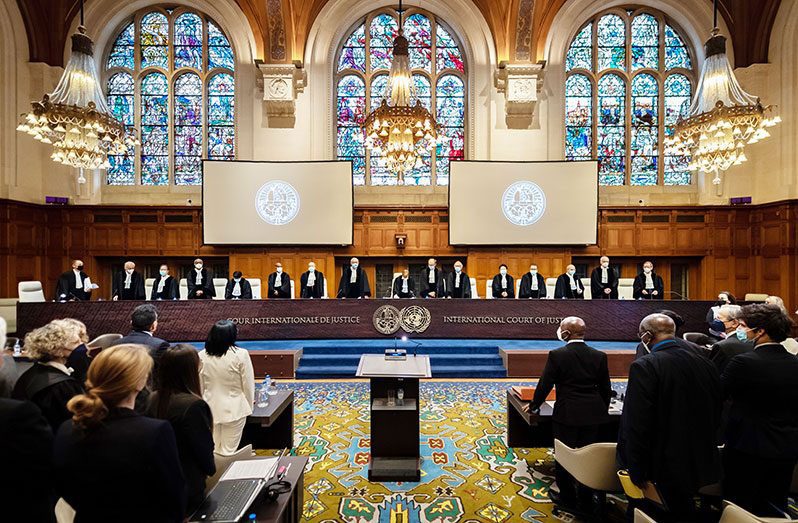TODAY, Guyana will present its closing arguments to the International Court of Justice (ICJ), the highest court in the world, on the preliminary objections that were raised by Venezuela in the border controversy case.
On Monday, Venezuela’s representatives, in concluding their oral arguments, called upon the ICJ judges to dismiss the case.
Last Friday, when Guyana’s round of argument commenced Professor Ordinaire, Université Catholique de Louvain and member of the Institut de Droit International, Foley Hoag, LLP and the Bar of Brussels, Pierre d’Argent said that Venezuela’s claim was inadmissible.
Another member of Guyana’s legal team, Christina Beharry, who is a member of the Bars of the District of Columbia, the State of New York, England and Wales, and the Law Society of Ontario, made submissions on how Venezuela’s preliminary objections conflict with the ICJ’s 2020 judgement.
Further, member of the Bars of the United States Supreme Court and the District of Columbia, Paul S. Reichler addressed the legal standard under the monetary gold argument and the fact that the UK is not an indispensable third party to the proceedings.
Guyana’s representative, Professor Philippe Sands, KC, had asked the ICJ to reject the “incoherent, legally misconceived, and factually baseless” preliminary objections that were raised by Venezuela.
In adding to Guyana’s position on the matter, Professor Sands said Venezuela’s preliminary objections totally ignored the realities of the 1966 Geneva Agreement, the aim of which was to address any controversy over the 1899 Arbitral Award.
Venezuela had asked the ICJ to dismiss Guyana’s application to reaffirm the validity of the 1899 Award, and solidify its support for a “peaceful resolution” of the Guyana/Venezuela border controversy.
Executive Vice-President of Venezuela, Delcy Rodríguez, had claimed that the Spanish-speaking country is the “sole indisputable inheritor” of the Essequibo region and the Monetary Gold Principle.
Although Venezuela had claimed that the ICJ did not have jurisdiction to hear the substantive case, the country made a U-turn following the court’s December 2020 ruling on its jurisdiction to hear the case. Venezuela on that occasion contended that Guyana has no standing in the matter.
Venezuela argued that the United Kingdom is the proper party, since the territory was “given” to Guyana by the British.
“Venezuela’s claims of fraud and corruption are false, and they are to be treated with great caution… Their fanciful and unmeritorious nature makes it clear, crystal-clear Venezuela’s attack on the validity of the 1899 Award,” Professor Sands said while addressing specific factual allegations that were made.
He said that the nature of Venezuela’s arguments reflects the true purpose of the preliminary objections, which is to avoid the court addressing their “hopeless allegations”.
Guyana had moved to the ICJ with its case in March 2018, challenging the non-participating Bolivarian Republic of Venezuela over its disagreement on the legal validity and binding effect of the 1899 Award.
In a December 18, 2020, 12-4 majority ruling, the ICJ upheld that it has jurisdiction to entertain Guyana’s contention concerning the validity of the 1899 Award about the frontier between British Guiana and Venezuela, and the related question of the definitive settlement of the land boundary.
The ICJ pointed out, too, that both Guyana and Venezuela had agreed to the 1966 Geneva Agreement, which showed that both parties had accepted the possibility of the controversy being resolved by means of judicial settlement.
After a case management meeting, the ICJ had set time limits for Guyana and Venezuela to file written pleadings on the merits of the case.
Guyana met its March 8, 2022 deadline to submit its Memorial on the merits of its case to the court. Venezuela, on the other hand, submitted preliminary objections.
As a result, the ICJ allowed for such an objection to be lodged and considered by the court, and, as a consequence, the proceedings on the merits of the case were suspended until it rules on the preliminary objections.
Guyana maintains that a judicial settlement of the matter is the only recourse remaining, as it has exhausted all other avenues.
As recently as October 4, the United States government reaffirmed the validity of the 1899 Arbitral Award, and solidified its support for a “peaceful resolution” of the Guyana-Venezuela border controversy through the proper court, if there is any deviation from that Award.
Guyana seeks to obtain a final and binding judgement that the 1899 Arbitral Award, which established the location of the land boundary between the two countries, remains valid, and that the Essequibo region belongs to Guyana, and not Venezuela.



.jpg)











